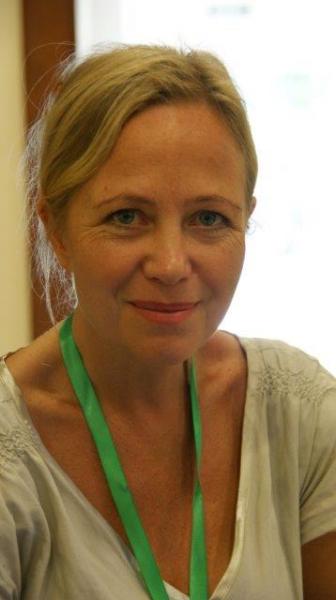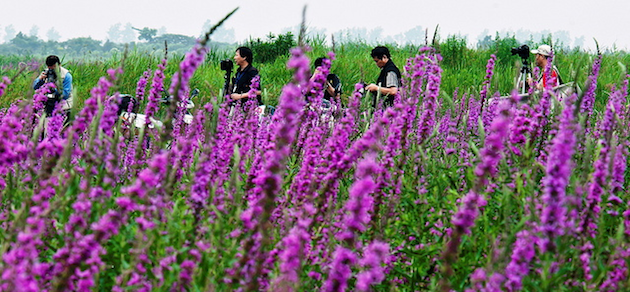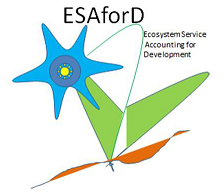
Ecosystems offer valuable benefits that people depend on for their survival and livelihoods, such as: the provision of timber, fish and drinking water; the regulation of our water and air; and by providing areas for recreation, tourism and cultural activities.
However, the benefits and economic value derived from ecosystems are often not measured and thus overlooked in development decisions. As ecosystems deteriorate worldwide, so does their capacity to support human wellbeing and sustainable economic growth.
Ecosystem Service Accounting for Development (ESAforD) is a four-year research program that will work in eight countries to enhance the methodology for ecosystem accounts, the most comprehensive of all types of natural capital accounts that incorporate a broad collection of data to measure the services provided by ecosystems.
ESAforD is a collaboration between the Swedish Environmental Protection Agency (SEPA), the seven Environment for Development (EfD) Centers in China, Chile, Costa Rica, Ethiopia, Kenya, South Africa and Tanzania, and the Wealth Accounting and the Valuation of Ecosystem Services (WAVES) partnership. It is funded by the Swedish International Development Cooperation (Sida).
Jessica Alvsilver is an environmental economist with the Swedish EPA and the coordinator for ESAforD. Alvsilver and her colleague Per Strömberg presented on the program at the WAVES Policy and Technical Expert Committee’s third annual meeting in Washington, D.C. in late October 2014. She recently spoke to the WAVES team about the program.
What is the Ecosystem Service Accounting for Development program (ESAforD) aiming to achieve?
As you know, ecosystem service valuation is still experimental. Our objective is to develop the methodology to do ecosystem accounts and help standardize the international guidelines within the SEEA ecosystems framework. We would also like this work to have an impact on policy in the countries, but it is not the primary objective.
What makes the program unique is the multi-country collaboration—we are using the world as our laboratory. The EfD centers have the institutional set up and will be in regular and close contact. By the end of the four years we plan to publish a study to share our results with the scientific community who can then use and build on them, but also to have generated new ideas and programs that can contribute to better decision-making. Although the program may stop, the institutional centers will continue by themselves.

How and why were the eight countries chosen? (Chile, China, Costa Rica, Ethiopia, Kenya, South Africa, Sweden and Tanzania)
The choice of countries is based on existing institutional collaborations. The EfD countries possess highly qualified in-country environmental economists that are actively attached to research as well as policy-related institutions in their respective countries. The group of centers has through years of collaborative research built up a social capital that facilitates and benefits the multi-country research intended in the program. The program can also help to build further capacity in the countries.
How will the work be carried out?
We are currently starting up the process by recruiting post-doctorate candidates in economics who will work full time carrying out the research with the environmental economists at each center. Once on board, they will form the working group that will design and conduct the multi-country empirical work to address the challenge or methodological issue identified by the experimental ecosystem accounting framework. Because it is in their hands, there is more ownership of the project and it will be more productive. During this first year we will decide what ecosystem service to look at, the criteria for selection, and what data exists.
We plan to have two large meetings per year—one coinciding with the annual EfD meeting, and the other coinciding with the annual WAVES or PTEC meeting. Additionally, we will hold at least monthly videoconferences. Our next large meeting will be in Shanghai in November.
The Swedish EPA plans to share the results with international groups such as the European Union, the Organization for Economic Co-operation and Development (OECD) and the Convention on Biological Diversity (CBD).

Has work begun and where? Can you give an example of what ecosystem services will be looked at in different countries?
The first workshop with the collaborative partners was held in Dar es Salaam, Tanzania, in October 2014 where we started to narrow down the research question. The outcome was to address the challenge of scaling up the value of ecosystem services. It was also decided that the program will look at regulating services (which show the regulating impact of ecosystems such as the role of forests in watershed and erosion management.)
If possible we will all look at the same ecosystem service, but it may be two or three, the choice needs to be realistic in each country and collectively decided. So far, in all our discussions water has come up as being very important, as a component of forests, marine areas, or wetlands.
Will different methodologies be used in different countries?
Different methodologies will probably be used in different countries, and potentially different methodologies in the same country. We will start with a feasibility study to see what would be possible for all countries to carry out. We are looking at what we all have in common and will then see what data exists. It is a combination of deciding the ecosystem and study approach, so one might determine the other.
How do you see WAVES as a partner?
WAVES is an important collaborate partner in program development by providing advice and guidance, and the PTEC committee is a crucial partner in methodological development, to whom we can ask for feedback on the way forward. WAVES will also be instrumental in taking the results “further”, especially with regards to policy and the accounting framework.
